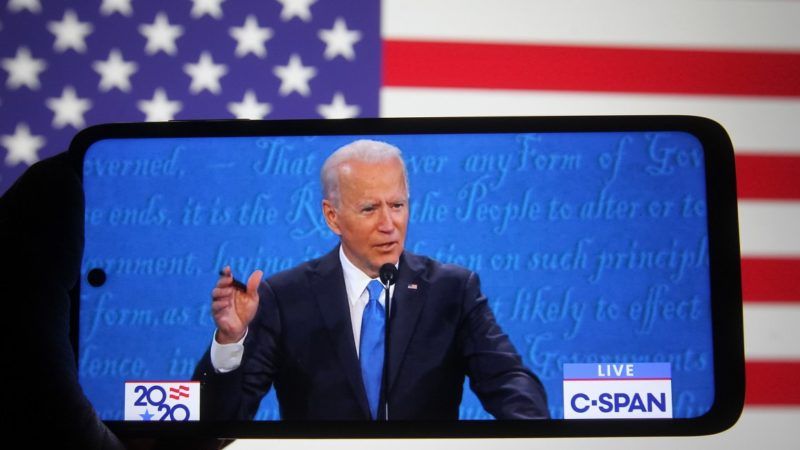Joe Biden Envisions a Kinder, Gentler Drug War. We Should Demand Its End.
Drug courts and mandatory treatment models often lead right back to incarceration.

Thursday night's final presidential debate between President Donald Trump and former Vice President Joe Biden was notable in that neither man rushed to the defense of America's tendency to throw people in jail to serve long sentences for crimes, even if both men have records of wanting to do so.
Biden reiterated his position on the drug war, that rather than arresting and imprisoning people for drug use, these people should be helped via drug courts and mandatory drug treatment. (Biden also claimed that Republicans don't support drug courts, which isn't true: President George W. Bush's National Drug Control Strategy touted the local use of drug courts.)
Biden probably thinks he's advocating for something good, as do the Democrats who included this position in the party's 2020 platform, which says that nobody should be incarcerated "solely because they use drugs" and instead calls for diversionary treatment and drug courts.
The problem is that this position is simply perpetuating the drug war, but in a way that seems kindly and more accommodating. It operates on the incorrect assumption that every single person who uses illegal drugs is an addict who needs intervention in order to stop. Biden's view, to be fair, could be influenced by his experiences with his son Hunter's struggles with addiction.
But the drug court system is overly reliant on the threat of incarceration as part of its very operating system. Drug courts often require that anybody who wants the "mercy" of the court plead guilty, give up the rights, and confess to an addiction—one they may not have—in order to avoid jail.
Look at this description from 2007 of a court-supervised drug diversion program in Harris County, Texas, called Success Through Addiction Recovery (STAR), praised by the Bush administration. The report brags about the fact that some people find participating in the drug court to be harsher than incarceration and turn it down:
A highly structured, 3-phase treatment program, STAR involves 12-step programs or approved alternatives, group and individual treatment and counseling programs, frequent random drug testing, and regular interaction with the judges. Although designed to last at least 12 months, there is no "automatic" graduation from STAR. To graduate and successfully reenter society, participants must take certain positive steps to become drug and crime free, including demonstrating continued sobriety through drug testing and getting an education or obtaining gainful employment. Even after graduation from the program, STAR clients must participate in aftercare for a minimum of 12 months. Graduates must continue to report to a case manager who monitors their sobriety, and successful discharge is determined on a case-by-case basis.
The report says that "the folks of STAR must be doing something right." But subsequent research of drug court operations has shown that, in reality, drug courts in some cities have led to increased police crackdowns on drug users.
A report from 2018 from the nonprofit Social Science Research Council examined drug court systems in the United States and Latin America and found that in many cities, the existence of drug courts actually drove up arrests for simple drug possession.
And because these drug courts are so demanding, as the STAR program bragged, people sometimes fail to comply. When they do, they end up in jail, the very same place these programs are supposed to be diverting from. The 2018 report found that, in New York City, people who failed drug court ended up with jail sentences higher than those who just pleaded guilty and didn't bother with diversion at all.
When it comes down to it, forcing everybody found to be using drugs into drug courts and treatment is putting a gloss of false kindness and caring on a harsh government system of mandates that punishes people not for harming others or their property but for what they do with their own bodies. Mandatory drug treatment means that these policies Biden supports must be backed up with additional penalties for those who aren't cooperative.
People who are addicted and do need assistance genuinely should be able to seek out help, and government social services could be useful there. Drug courts might be a useful tool for approaching those whose drug addictions have led them to commit other crimes as well.
But a system where the drug use itself still brings with it a threat of punishment is not a system that is ending the drug war. It is admirable of Biden not to abandon Hunter to addiction and to continue to love him and try to help him as needed. But he's also attempting to force policies on everybody that may not be as bad as the mass incarceration of the 1980s and '90s, but nevertheless still perpetuate the failed war on drugs.


Show Comments (39)